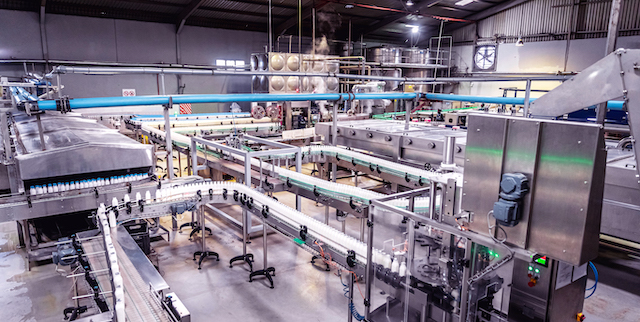News

ECS Delivers True Long Term Success as Trusted Advisors
People and organizations leverage trusted advisors in all facets of life. Whether it is something as commercial as an auto mechanic or as intimate as a primary care physician, attorney, or wealth advisor, trusted advisors play a role just about everywhere. They maintain deep, current knowledge in specialized fields, and they stand ready to support those in need. They are driven by excellence, thinking beyond themselves or their own organization and focus on the broader environment. Where their focus intersects with the needs of a client, a true trusted advisor relationship can take hold.
Control systems integration is young but maturing when compared to many other functions in legacy buildings and operations. The discipline, which barely existed a generation and a half ago, has become the technological focal point of modern manufacturing. There are no lulls or definable steps as technology continually advances at a dizzying pace. What started as ways to simplify wiring and logic applied to flexibility in controls has evolved into a holistic environment which links manufacturing, operations, and supply chains via a web of connected people and equipment. Manufacturers leverage related professionals each day to stay at the edge of technology and to apply it effectively.
ECS Solutions (ECS) has been around since the dawn of the systems integrator-for-hire concept. Our success has been driven by working collaboratively with our clients as true strategic partners. We know that enduring bonds do not develop by accident nor out of contractual obligation. Our clients expect that we know not only where technology is today, but also where it is going. They leverage our extensive knowledge and experience in ways that address both their immediate needs and their continuing objectives.
Read More | Posted In: Bakery Industry, Beverage Industry, Blogs, Chemical Industry, Consumer Goods, Distilleries, Food Industry, Life Science Industry, Metals Industry, News

KNOW YOUR LOOP BEFORE YOU ATTEMPT TO TUNE YOUR LOOP – PART 2
In the last article for this topic, we discussed the importance of field data collection and the importance of a methodical approach to PID tuning. I introduced the concept of the bump test and that its results would help guide the steps and equations used in proper tuning. Here I will explore that concept in greater detail. At ECS we use a visual tool for data collection in every instance. The tool may be part of a controller suite, or it may be stand-alone but, in any case, it is imperative to capture accurate information about the performance of your system before planning and then programming a solution.
In the interest of time, this article will focus on tuning concepts for self-regulating loops as they make up the majority of applications in the industrial field. A common example of this type of loop is a flow control which varies flow through a pipe via either variable speed control on a pump or a position-controlled valve. In this example, the flow can be adjusted by speed adjustment of the pump or position of a valve and the result of the change ordered from the controller is stable and is generally fast and repeatable.
Read More | Posted In: Beverage Industry, Blogs, Chemical Industry, Consumer Goods, Food Industry, Life Science Industry

Innovative Tools for the Evolving Systems Integrator
The personnel challenges facing virtually every industry over the last few years have been nothing short of astonishing. Proper candidates have become increasingly difficult to court and bring on board. New staff in key roles are tasked to accomplish more with fewer floor operators and technology is increasingly leveraged to close the resulting gaps. This is not unique in history although it may seem that way due to the current media deluge surrounding business intelligence and general-purpose visibility software that makes life easier, smarter, and generally more efficient.
Industrial software is again playing a leading role in the current intelligence revolution. Inductive Automation didn’t invent floor supervisory (SCADA) software, nor did they invent the first responsive, general-purpose web software. However, their current offerings certainly do marry these concepts together in a way that hasn’t existed in industry before. Since 2010 their award-winning Vision Module has enhanced the experiences of factory floor users everywhere, easily connecting complex factory controllers to databases, alarm and reporting systems, and intuitive visualization tools. This product is robust, proven, and works very well for users “inside the industrial network” of many facilities. Today this is coupled with the newer Perspective Module which is an equally powerful tool for use in mobile-responsive applications. For situations where a user may be “outside the industrial network” or simply need to utilize a variety of hardware platforms like PCs, phones, or tablets, Perspective provides an ideal solution.
Read More | Posted In: Bakery Industry, Beverage Industry, Blogs, Chemical Industry, Consumer Goods, Food Industry, Inductive Automation, Life Science Industry, Metals Industry, SCADA

Know Your Loop Before You Attempt to Tune Your Loop
PID (proportional, integral, derivative) control algorithms are probably the most commonly used process control strategies in the industry. PID controllers or code are used to optimize process control, providing the means to ensure product stability and company profitability. These functions exist in small but powerful standalone controllers and as part of the instruction set of most modern large-scale programmable controllers. The code within PID controllers is frequently used in tandem with other control functions to create both simple and complex control systems.
PID control has existed for decades and there are many tools available to help implement and tune systems. Thus, this is generally easy to deploy in most situations. Straightforward methods exist to bring most processes into some degree of control. Higher-order analysis and techniques are needed for more complex control loops, products, or systems. Other factors must be considered like upstream and downstream operations and energy consumption. Furthermore, safety and regulatory items must be examined as well as these control loops and associated equipment do not exist in a vacuum. Volumes have been written about detailed techniques for tuning loops so this article will cover only basics in preparation for a later piece on the tuning of atypical loops.
Read More | Posted In: Beverage Industry, Case Studies

Ignition Perspective® Module
Human-machine interface (HMI) vendors have been promising a utopia based around web-based technologies for over two decades. The prospect of simply providing a web address to anyone within an organization that leads to a fast-loading, full-power supervisory control and data acquisition (SCADA) system has been on most factories’ wish list for a long time. After all, internet page tools and functionality have far outpaced advancements in SCADA software over the same time. The advancements seem to leap forward every time someone reloads a page, with new widgets and tools available almost daily. When coupled with hardware developments like high contrast screens; enhanced touchscreen operations; and capabilities like Bluetooth, accelerometers, geolocation, and more; a flexible, web-based option has been coveted.
What many casual users fail to understand about HMI solutions is exactly how tightly the software is connected to the factory floor controllers. This connection via high-security networks, VPNs, and masks, can be tricky to navigate, particularly when the architecture is intentionally complex to provide security for the systems. Further, most people don’t realize the architectural complexity of software that link to sometimes multiple databases and remote data sources, where gigabits of proprietary information streams into and out of the SCADA application. It has been the responsibility of the integrators of these solutions to protect would-be users from themselves in a lot of applications. Poorly developed programs could create vulnerabilities to the operation of equipment, expose floor workers to potential risk, and possibly allow trade secrets to escape into cyberspace.
Read More | Posted In: Bakery Industry, Beverage Industry, Blogs, Chemical Industry, Distilleries, Food Industry, Inductive Automation, Metals Industry, SCADA

DVR Module for Troubleshooting and Continuous Improvement
Effective mass production manufacturing operations involve both monitoring of production processes and continual improvement. ECS Solutions, Inc (ECS) has developed an innovative, powerful tool to help their clients develop peace of mind that their products are being manufactured accurately and efficiently while providing a platform to easily improve future interactions. The Process DVR tool satisfies the modern expectation that anything that can be observed visually should be recorded and easily viewed later. When used effectively, the result is truly optimized production control where the best-trained operators deliver accurate results with the least possible waste.
Data Historian capabilities have been built into many vendors’ SCADA systems for a long time. Astute process engineers can call up trending information that illustrates the states and conditions within an automated system, the multitude of lines crisscrossing an HMI terminal in a way their trained eyes can discern. This is an excellent tool by itself, provided that an operation has personnel who are trained to read and interpret the cryptic information that is returned from a standalone Historian. ECS believed that this was conceptually sound but that a more manageable solution would help to bring wider benefits to their processing clients.
Read More | Posted In: Bakery Industry, Beverage Industry, Chemical Industry, Clean in Place, Digitalization, Distilleries, Food Industry, Inductive Automation, Life Science Industry, SCADA

How to Identify, Quantify, and Mitigate Risk in Industrial Operations
A key responsibility of executives and managers in manufacturing is that of risk management. This refers to the obvious risk of physical operations and staff protection, but it also includes quite a bit more: risk to contracts, availability of brands of the direct employer and those of other clients, reputation(s), regulatory, and risk to public safety and health are all increasing concerns with the operating level of a senior executive or manager.
Risk identification is a critical first step; without which, corrective actions cannot be undertaken or could possibly be misguided. Because risks evolve constantly, it is rare that they can be spelled out in a succinct and comprehensive volume. One obvious solution is to install the correct staff in the tiers immediately below the executives but that often raises questions about the specific qualifications of these employees, their tenure and familiarity with every facet of their role within that organization, and whether an overarching net has been cast to identify and compartmentalize relative risks. Further concerns arise around whether an internal team is free of groupthink and whether they possess the proper experience, qualifications, and motivations. (more…)
Read More | Posted In: Bakery Industry, Beverage Industry, Chemical Industry, Food Industry, Life Science Industry, Metals Industry

The Process Functional Ecosystem
Companies that operate in multi-step, multi-ingredient batch processing operations employ a combination of complex procedures, business and operational systems, and communications. The range of tools and machinery used to process a potentially vast array of ingredients and process steps are what it takes to make processors successful. Entire working cultures emerge from these operations that foster a focus and achieve positive outcomes.
The more specialized the market and operation, the lower number of people who operate within that domain. This doesn’t always allow for regular interaction with a broad spectrum of manufacturing peers, which can leave individuals and organizations feeling they are so unique that they are relatively isolated. They frequently feel little confidence that people outside their close-knit internal group can effectively understand, let alone support them. The possibility exists that they are rare, but they are not entirely unique and there are outside firms that are also closely aligned and, in fact, true peers as well.
ECS Solutions (ECS) operates upon this landscape. They have established a collective corporate consciousness that is aligned with the DNA of their core clients: batch processors. ECS is immersed in the behaviors and characteristics of these clients, and it is reflected in nearly every aspect of their operation. (more…)
Read More | Posted In: Bakery Industry, Beverage Industry, Chemical Industry, Food Industry, Metals Industry, News
Dynamic Perspective Objects with Sepasoft’s Batch Module
One of the most exciting things about Sepasoft’s Batch and Procedure module is that it enables tight integration between the process cell (as it is functionally defined) and the graphical interface (how it is presented to the user). By using the various tools in the Ignition toolbox (creative scripting, querying, and binding), it is possible to create dynamic views that represent the ISA-88 objects of a process cell. As the process cell definition changes (new units, new phases, etc) these dynamic objects automatically update as needed. This allows for less development time, a consistent user experience, and a lower maintenance control system. (more…)
Read More | Posted In: Bakery Industry, Beverage Industry, Blogs, Chemical Industry, Food Industry, Inductive Automation, Life Science Industry, Metals Industry, News
ECS Eliminates Bottlenecks with Flexible Packaging Solution
Industrial systems are generally designed with a perfect balance between product manufacturing and packaging output. Changes to output requirements, product makeup, or packaging requirements frequently create imbalances known as process bottlenecks. The job of process and industrial engineers is to identify the slow points within the complete process and develop solutions to eliminate obstructions. Today’s solutions to a slow point in the middle of the line, for example, solve not only the current issue, but often highlight the next weakest link in the manufacturing chain and the process then repeats.
This situation is particularly prevalent in large-scale food manufacturing where systems designed to create one product are frequently adapted for future needs. Simple changes to ingredient makeup or quantities can upset the balance within processing systems or require the insertion of process steps that are outside of the equipment’s original intent. Perhaps just as frequent are changes in packaging that mandate the addition of new primary or secondary packaging machines to be used in conjunction with or instead of a line’s original machinery. All of these are good problems to have in that they indicate a flexible level of operation, and they create opportunities for manufacturers to support more customers with more products. (more…)
Read More | Posted In: Bakery Industry, Beverage Industry, Food Industry


